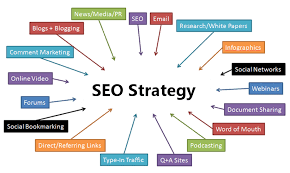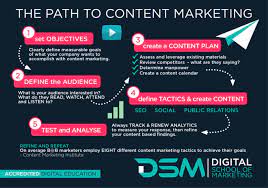The Importance of SEO Strategy in Digital Marketing
In the ever-evolving landscape of digital marketing, Search Engine Optimization (SEO) remains a crucial element for businesses looking to improve their online visibility and drive organic traffic to their websites. A well-crafted SEO strategy can make a significant difference in how your brand is perceived by search engines and potential customers.
Key Components of an Effective SEO Strategy:
Keyword Research: Understanding the keywords and phrases your target audience is searching for is essential for creating relevant and engaging content that ranks well in search engine results.
On-Page Optimization: Optimizing your website’s structure, content, and meta tags to improve its relevance and readability for both users and search engines.
Quality Content: Creating high-quality, informative, and engaging content that not only attracts visitors but also encourages them to stay on your site and explore further.
Link Building: Building a network of quality backlinks from reputable sites to establish authority and credibility in the eyes of search engines.
The Benefits of an Effective SEO Strategy:
An effective SEO strategy can yield several benefits for your business, including:
- Increased Visibility: By ranking higher in search engine results pages, you can attract more organic traffic to your website.
- Better User Experience: A well-optimized website provides a seamless user experience, leading to higher engagement and conversion rates.
- Credibility and Authority: Ranking well in search results establishes your brand as a credible source of information in your industry.
- Long-Term Results: Unlike paid advertising, the effects of SEO are long-lasting and can continue to benefit your business over time.
In Conclusion
In today’s competitive digital landscape, implementing a robust SEO strategy is essential for businesses looking to stand out online. By focusing on key elements such as keyword research, on-page optimization, quality content creation, and link building, you can enhance your online presence, attract more visitors, and ultimately drive business growth through organic search traffic.
7 Essential SEO Strategies for Effective Digital Marketing
- 1. Conduct keyword research to identify relevant search terms for your target audience.
- 2. Optimise on-page elements such as title tags, meta descriptions, and headings with your chosen keywords.
- 3. Create high-quality, engaging content that provides value to users and encourages them to stay on your site.
- 4. Build quality backlinks from reputable websites to improve your site’s authority and credibility.
- 5. Ensure your website is mobile-friendly and has fast loading speeds for a better user experience.
- 6. Regularly monitor and analyse your SEO performance using tools like Google Analytics to make data-driven decisions.
- 7. Stay updated with the latest SEO trends and algorithm changes to adapt your strategy accordingly.
1. Conduct keyword research to identify relevant search terms for your target audience.
In the realm of digital marketing, a fundamental tip for enhancing your SEO strategy is to conduct thorough keyword research to pinpoint the most relevant search terms for your target audience. By understanding the specific keywords and phrases that your potential customers are using to search for products or services like yours, you can tailor your content and website optimisation efforts to align with their needs and preferences. This proactive approach not only boosts your visibility in search engine results but also helps attract qualified organic traffic that is more likely to convert into valuable leads or customers.
2. Optimise on-page elements such as title tags, meta descriptions, and headings with your chosen keywords.
To enhance your SEO strategy in digital marketing, it is crucial to optimise on-page elements such as title tags, meta descriptions, and headings with your selected keywords. By incorporating relevant keywords into these key areas of your website, you can improve its visibility and relevance to search engines. Crafting compelling title tags and meta descriptions that accurately reflect the content of each page can entice users to click through to your site, while strategically using keywords in headings can help search engines understand the context of your content better. This practice not only boosts your site’s SEO performance but also enhances user experience by providing clear and informative cues about your content.
3. Create high-quality, engaging content that provides value to users and encourages them to stay on your site.
Creating high-quality, engaging content that offers value to users is a fundamental aspect of a successful SEO strategy in digital marketing. By producing content that is informative, relevant, and compelling, businesses can not only attract visitors to their website but also keep them engaged and encourage them to explore further. This approach not only improves the user experience but also signals to search engines that your site offers valuable information, ultimately helping to boost your search engine rankings and drive organic traffic.
4. Build quality backlinks from reputable websites to improve your site’s authority and credibility.
Building quality backlinks from reputable websites is a crucial aspect of a successful SEO strategy in digital marketing. By establishing a network of strong backlinks, your site gains authority and credibility in the eyes of search engines, which can significantly impact its ranking in search results. These high-quality backlinks act as endorsements from trusted sources, signalling to search engines that your content is valuable and relevant to users. This not only boosts your site’s visibility but also enhances its reputation within your industry, ultimately driving organic traffic and improving overall online performance.
5. Ensure your website is mobile-friendly and has fast loading speeds for a better user experience.
Ensuring that your website is mobile-friendly and loads quickly is a crucial aspect of an effective SEO strategy in digital marketing. With the increasing use of mobile devices for online browsing, having a responsive design that adapts to different screen sizes not only improves user experience but also contributes to higher search engine rankings. Fast loading speeds further enhance user satisfaction by reducing bounce rates and encouraging visitors to explore your site, ultimately leading to improved engagement and conversion rates. By prioritising mobile-friendliness and speed, you can create a seamless browsing experience that benefits both users and search engine algorithms.
6. Regularly monitor and analyse your SEO performance using tools like Google Analytics to make data-driven decisions.
Regularly monitoring and analysing your SEO performance using tools such as Google Analytics is a vital tip in developing a successful SEO strategy in digital marketing. By tracking key metrics like website traffic, user behaviour, and conversion rates, businesses can gain valuable insights into the effectiveness of their SEO efforts. This data-driven approach enables informed decision-making, allowing for adjustments and refinements to be made to optimise performance and achieve desired results in search engine rankings and overall online visibility.
7. Stay updated with the latest SEO trends and algorithm changes to adapt your strategy accordingly.
It is crucial to stay informed about the latest SEO trends and algorithm changes in digital marketing to ensure the effectiveness of your strategy. By keeping up-to-date with industry developments, you can adapt your approach to align with best practices and maximise the impact of your SEO efforts. Remaining vigilant and responsive to changes in search engine algorithms allows you to stay ahead of the curve and maintain a competitive edge in the online landscape.



